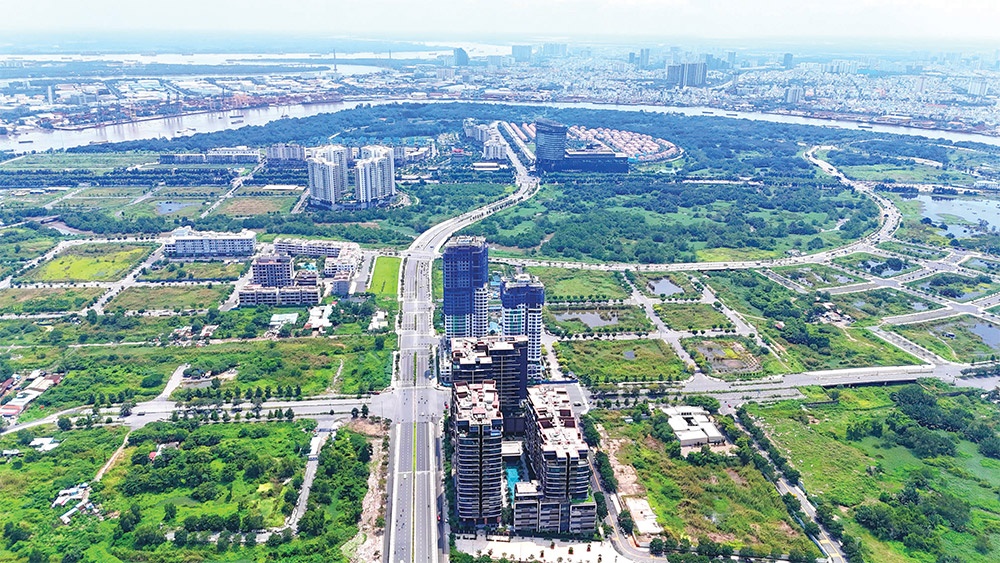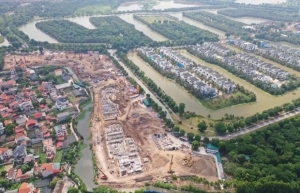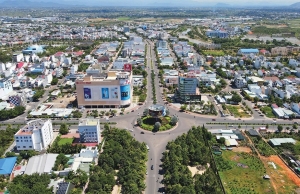Rapid law implementation may propel market fortunes
 |
| Rapid law implementation may propel market fortunes, photo: Le Toan |
Last week, Prime Minister Pham Minh Chinh issued urgent instructions on speeding up implementation of the upcoming Land Law.
The prime minister requested relevant authorities to quickly complete documents so that the law could move into effect on July 1 this year instead of the beginning of 2025.
According to Dr. Tran Xuan Luong, deputy director of the Market Data Research Institute, speedier implementation of the law will bring positive effects to the real estate market, especially housing supply.
“When supply increases, it will help reduce house prices, thereby increasing people’s opportunities to access housing,” Luong said.
“Investors and developers are looking forward to the implementation of the new law, which will remove obstacles for a range of projects that are struggling due to stalled procedures and lack of legality. For them, the earlier the better,” he said.
Le Hoang Chau, chairman of the Ho Chi Minh City Real Estate Association, said that the new law being applied from July 1 would help to remove bottlenecks for the market. “One of the most important points of the new Land Law is to remove the old land pricing system. Local authorities will now base the pricing on the purpose, land use term, and input information of a property to determine the land price according to the market. Parties have been waiting for that for a long time,” Chau said.
Besides this, the new law also allows for the expansion of limits on transfer of agricultural land use rights by individuals, and regulations on agricultural land concentration and accumulation. “This will promote large-scale agricultural development and draw in more business participation,” Chau added.
In addition, the law also provides a legal framework for tourism real estate, deemed a black spot of the current law, causing commercial housing projects to not be approved for long periods. The new law will help localities have a basis for approving such schemes.
Greater cash flows
Believing that large cash flows from the stock market or from savings could soon land in the real estate market, many investors have launched products in recent months with a series of incentives.
Last month Gamuda Land announced an attractive sales policy for Eaton Park in Thu Duc of Ho Chi Minh City. Accordingly, customers will only need to spend 5 per cent of the apartment value to sign a contract.
With a favourable payment schedule of up to five years, in the first three years buyers only need to pay 30 per cent, in six instalments, until receiving notice of handover of the apartment.
When receiving a home, the buyers then must pay an additional 35 per cent, and the remaining cost is divided into two instalments of 15 per cent each for the next year. In addition, the developer also offers a preferential discount rate, usually no less than 5 per cent, for early applications.
The Standard villa project in the southern province of Binh Duong, through An Gia Group, applies a payment policy of 10 per cent and buyers can move in immediately, with a sum of 20 per cent paid in the following 12 months. The buyers after that can pause payments for up to two years from the date of signing the sales contract before they have to pay another 65 per cent.
In addition, An Gia also issued a commitment policy to rent town houses and shophouse products with rental incentives of VND25-40 million ($1,000-1,600) per month, lasting up to 18 months.
“Buying a house that has been handed over, but dividing payments into smaller portions, will help customers get a home right away without needing a bank loan, and give people more time to balance and prepare cash flow,” an An Gia representative said.
Other groups such as Nam Long, Hung Thinh, and Vinhomes are all offering attractive discounts and payment policies.
“Observing the stock market recently with liquidity sometimes reaching up to VND35 trillion ($1.4 million) per day or savings interest rates falling sharply to less than 5 per cent per a year, investors believe that there will be cash flow in the near future. This is an opportunity to dominate the market and draw in customers for a new growth cycle,” said investor Nguyen Manh Cuong.
A peak time
According to Dr. Nguyen Huu Huan from Ho Chi Minh City University of Economics, the market can now thrive thanks to the government’s issuance of policies to remove obstacles for real estate businesses.
“One of the bright signs is that looser monetary policy has encouraged money to flow into investment channels instead of just savings. When the stock market gets better and real estate liquidity increases again, in a short time, cash flow will begin to move from stocks to real estate. Such a movement of cash will bring expectations for the property market to gradually recover by the end of 2024,” Huan said.
Economic expert Dr. Nguyen Tri Hieu said that when savings interest rates decrease, investors are no longer that interested in saving. Instead, they will aim for channels that bring higher profits, including putting money into real estate or in manufacturing and business.
“From Q3/2024, the market will welcome a large amount of cash flow into real estate with the expectation that this will be an investment channel that brings good, stable profits. Investors need to take advantage of this time to put down money with many incentives from developers,” Hieu said.
He added that the high increase demand of end-users, and not speculators, will be one of the decisive factors in forming products for real estate businesses in 2024 and beyond. In provinces and cities with diverse economic development, there is a need for more supply to meet demand.
In its residential industry report published in March, Mirae Asset Securities Company said that the most difficult period of the real estate market had passed and the recovery process was gradually taking place, with the main catalysts being rapid urbanisation, accelerated public investment, increasing demand for accommodation, and government determination.
Mirae Asset cited that the total number of new apartments launched in Ho Chi Minh City and surrounding areas this year are expected to have about 12,000-15,000 units.
“Although new supply is relatively limited in the first months of the year, there will be stronger growth in the second half of the year, thanks to legal policies starting to take effect,” the report said.
According to Savills Vietnam, the number of new apartments opened for sale in Ho Chi Minh City in 2024 will quadruple compared to the previous year. It is expected that by 2026, the market will receive about over 115 new projects, providing an additional 40,000 apartments to the current supply.
| Trang Le, head of Research & Consulting JLL Vietnam
In Hanoi over the next nine months or so, the market is expected to see limited supply with only 1,500-1,800 high-end units set to be launched, mostly in the second half of 2024. Several projects have started advertising campaigns and pre-launch activities, supporting the market’s expectations for more activity later this year. Price increase is expected to continue due to supply scarcity and increasing prices expected in many projects nearing completion. The ready-built landed properties market is expected to welcome around 1,200-1,400 new units by the end of 2024. However, it may be subject to adjustment later due to uncertain launching plans of some notable projects in Hanoi such as the Sunshine projects in Ciputra, and the new phases of HUD Me Linh. The demand for such properties is expected to be moderate compared to 2021-2022, and the liquidity of high-value units will likely remain challenging. Meanwhile in Ho Chi Minh City, in the remainder of the year, the high-end apartment and ready-built landed properties markets are expected to respectively welcome about 4,200 and 1,500 new units. However, new launch events are expected to only active in the second half of 2024. Demand is projected to stay low until new supply moves towards the lower price segment and factors such as interest rate fluctuations and economic stability stabilise. With some new laws not set to take effect until 2025, the market outlook for the remainder of 2024 is unlikely to undergo substantial changes. Both developers and buyers are expected to adopt a cautious wait-and-see approach. The possible selling price adjustment is subject to great deal of uncertainty, depending on the number of projects that can be launched and the economic movement in the short term. |
 | Revised Land Law expected to drive remittances to real estate market: Experts The Land Law (revised), which expands land use rights for overseas Vietnamese (OV) and Vietnamese citizens residing abroad, meets the aspirations of OVs and contributes to mobilising investment resources to Vietnam at the same time, said Nguyen Duc Hieu, standing member of the National Assembly (NA) Economic Committee. |
 | Implementation of new land laws must benefit investors Foreign investors have expressed their concern about the upcoming implementation of new laws on housing, land, and real estate business, which aim to help expand the right to do business and attain ownership in Vietnam. |
What the stars mean:
★ Poor ★ ★ Promising ★★★ Good ★★★★ Very good ★★★★★ Exceptional
Related Contents
Latest News
More News
- An Phat 5 Industrial Park targets ESG-driven investors in Hai Phong (January 26, 2026 | 08:30)
- Decree opens incentives for green urban development (January 24, 2026 | 11:18)
- Public investment is reshaping real estate’s role in Vietnam (January 21, 2026 | 10:04)
- Ho Chi Minh City seeks investor to revive Binh Quoi–Thanh Da project (January 19, 2026 | 11:58)
- Sun Group launches construction of Rach Chiec sports complex (January 16, 2026 | 16:17)
- CEO Group breaks ground on first industrial park in Haiphong Free Trade Zone (January 15, 2026 | 15:47)
- BRIGHTPARK Entertainment Complex opens in Ninh Binh (January 12, 2026 | 14:27)
- Ho Chi Minh City's industrial parks top $5.3 billion investment in 2025 (January 06, 2026 | 08:38)
- Why Vietnam must build a global strategy for its construction industry (December 31, 2025 | 18:57)
- Housing operations must be effective (December 29, 2025 | 10:00)


 Tag:
Tag:



















 Mobile Version
Mobile Version